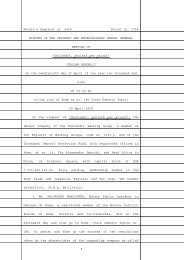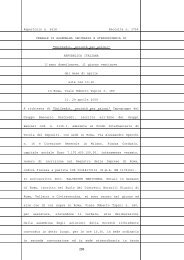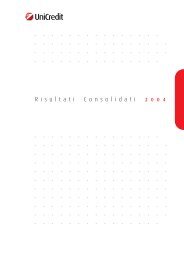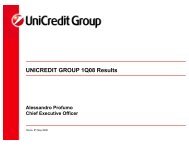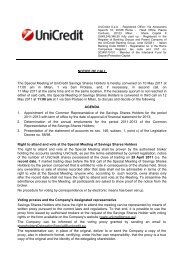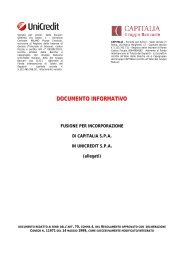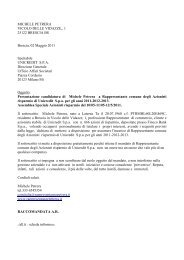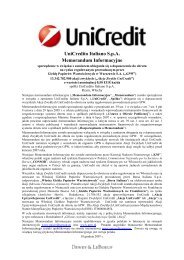Brochure Master in Corporate & Investment Banking - UniCredit Group
Brochure Master in Corporate & Investment Banking - UniCredit Group
Brochure Master in Corporate & Investment Banking - UniCredit Group
Create successful ePaper yourself
Turn your PDF publications into a flip-book with our unique Google optimized e-Paper software.
MASTER IN<br />
CORPORATE &<br />
INVESTMENT<br />
BANKING
NEW EDITION<br />
OF MASTER<br />
IN CORPORATE &<br />
INVESTMENT BANKING<br />
Six of Europe’s lead<strong>in</strong>g universities unite to create the<br />
<strong>Master</strong> <strong>in</strong> <strong>Corporate</strong> & <strong>Investment</strong> Bank<strong>in</strong>g for <strong>UniCredit</strong>.
Dear Participants,<br />
Well fi rst of all, congratulations to all of you who have won a place<br />
on the third International <strong>Master</strong> <strong>in</strong> <strong>Corporate</strong> & <strong>Investment</strong> Bank<strong>in</strong>g.<br />
It is a fi ne achievement.<br />
As you can imag<strong>in</strong>e I am delighted to launch this edition and to be<br />
its sponsor. Be sure that I will follow its progress with great <strong>in</strong>terest<br />
and I am curious to see how you will tackle the academic and<br />
development challenge fac<strong>in</strong>g you over the com<strong>in</strong>g two years.<br />
The <strong>Master</strong> <strong>in</strong> <strong>Corporate</strong> & <strong>Investment</strong> Bank<strong>in</strong>g comes at a time<br />
when we are beg<strong>in</strong>n<strong>in</strong>g to put the fi nancial crisis beh<strong>in</strong>d us and<br />
set ourselves new ambitious targets for the future. Our clients and<br />
their environments have changed and the nature of how bus<strong>in</strong>ess<br />
<strong>in</strong> the future will be transacted is also chang<strong>in</strong>g. The program, with<br />
the huge array of learn<strong>in</strong>g challenges it poses, is a perfect place<br />
to understand, address and prepare for these fundamental market<br />
developments.<br />
Furthermore, the <strong>Master</strong>s group, represent<strong>in</strong>g as it does, 18<br />
countries and all bus<strong>in</strong>ess areas of CIB, is unique because it is<br />
designed precisely along the type of landscape we are foster<strong>in</strong>g <strong>in</strong><br />
<strong>UniCredit</strong> CIB. We can count on a strong presence of colleagues<br />
from all these <strong>UniCredit</strong> countries and this will contribute to offer a<br />
global approach to learn<strong>in</strong>g and to foster network <strong>in</strong>terconnections,<br />
which will give us a competitive edge <strong>in</strong> the eyes of our clients. No<br />
technical systems will ever match the strength of personal bonds<br />
and trust between colleagues when it comes to cl<strong>in</strong>ch<strong>in</strong>g and<br />
execut<strong>in</strong>g client mandates. I hope you also use the time on this<br />
program to strengthen these bonds and build this trust.<br />
It is also with a great sense of pride that I welcome SDA Bocconi and<br />
the other 5 bus<strong>in</strong>ess schools who form the core teach<strong>in</strong>g staff for this<br />
program. Italian, German, Austrian, Turkish and Polish universities<br />
unite to offer one <strong>Master</strong> program with the same challenge that we<br />
face as an organization – namely br<strong>in</strong>g<strong>in</strong>g together the best of all our<br />
countries to offer our clients one superior franchise.<br />
It is with these thoughts that I wish you well for the challenges of<br />
the next two years. I ask you to use the time available to develop<br />
yourself, to establish strong relationships upon which you can build<br />
long term bus<strong>in</strong>ess success, to show leadership and drive change<br />
dur<strong>in</strong>g and after the program, to chase for cross functional bus<strong>in</strong>ess<br />
opportunities, and to further consolidate our organization.<br />
I look forward to jo<strong>in</strong><strong>in</strong>g you dur<strong>in</strong>g the course of the program to<br />
share our common path. I wish you the very best of good luck for<br />
your studies and I wish us all lots of success for the development of<br />
our bus<strong>in</strong>ess.<br />
Jean Pierre Mustier<br />
Deputy General Manager<br />
Head of CIB Division
MASTER IN<br />
CORPORATE &<br />
INVESTMENT<br />
BANKING
Summary<br />
1 MASTER PRESENTATION 5<br />
2 PARTICIPANTS AND REQUIREMENTS 7<br />
3 APPLICANTS, SELECTION PROCESS<br />
AND ENROLLMENT 9<br />
4 LESSON CALENDAR 10<br />
5 MASTER IN CORPORATE &<br />
INVESTMENT BANKING GUIDELINES 13<br />
6 MODULES, CONTENTS AND TEACHING METHODS 15<br />
7 BUSINESS SCHOOL PROFILES 23<br />
8 LOCATIONS 25<br />
9 PROJECT MANAGEMENT TEAM 27<br />
10 OVERVIEW 29<br />
3
<strong>Master</strong><br />
Presentation<br />
Participants<br />
and Requirements<br />
Application,<br />
Selection Process<br />
and Enrollment<br />
<strong>Master</strong> <strong>in</strong> <strong>Corporate</strong><br />
& <strong>Investment</strong><br />
Bank<strong>in</strong>g Guidel<strong>in</strong>es<br />
Modules,<br />
Contents and<br />
Teach<strong>in</strong>g Methods<br />
Bus<strong>in</strong>ess<br />
School Profi le<br />
Project<br />
Management Team<br />
Overview
<strong>Master</strong><br />
Presentation<br />
AIMS AND OBJECTIVES<br />
The <strong>Master</strong> <strong>in</strong> <strong>Corporate</strong> & <strong>Investment</strong> Bank<strong>in</strong>g (MCIB) is one of the core<br />
development programs <strong>in</strong> the CIB Division.<br />
The ma<strong>in</strong> aims of the <strong>Master</strong> are to:<br />
Develop competence <strong>in</strong> the consultation and analysis of client needs<br />
accross the whole value cha<strong>in</strong>.<br />
Build up greater knowledge <strong>in</strong> the <strong>in</strong>terest of client focus and earn<strong>in</strong>gs<br />
generation.<br />
Create an additional pool of professional talent with<strong>in</strong> CIB.<br />
Strengthen cooperation between cross functions <strong>in</strong> CIB and forge strong<br />
networks of colleagues who will drive change processes with<strong>in</strong> the division<br />
and enhance bus<strong>in</strong>ess opportunites.<br />
Capitalize on the nationality, bus<strong>in</strong>ess l<strong>in</strong>e<br />
and gender diversity potential – the unique<br />
sell<strong>in</strong>g po<strong>in</strong>t of <strong>UniCredit</strong>.<br />
It is a program whose content, aims and<br />
participant behaviour are closely aligned<br />
with the strategic mission of <strong>Corporate</strong> &<br />
<strong>Investment</strong> Bank<strong>in</strong>g.<br />
The new <strong>Master</strong> program has been<br />
redesigned to <strong>in</strong>clude a broader coverage of<br />
<strong>in</strong>vestment bank<strong>in</strong>g topics, so to reflect the<br />
shift <strong>in</strong> the consult<strong>in</strong>g challenges fac<strong>in</strong>g our<br />
professionals.<br />
The new MCIB will be taught by 6 European<br />
Bus<strong>in</strong>ess Schools headed by SDA Bocconi<br />
School of Management. They all enjoy<br />
outstand<strong>in</strong>g academic reputations <strong>in</strong> their<br />
home countries and <strong>in</strong>ternationally. The<br />
program is unique – be<strong>in</strong>g one of the new<br />
breed of customized <strong>Master</strong> programs<br />
designed for and with <strong>UniCredit</strong>. In this<br />
program we are jo<strong>in</strong>ed by Warsaw School<br />
of Economics for the first time – a further<br />
confirmation of the grow<strong>in</strong>g relevance of our<br />
bus<strong>in</strong>ess <strong>in</strong>terests <strong>in</strong> Eastern Europe and<br />
beyond.<br />
5<br />
Qualification: Level II Specialized <strong>Master</strong> <strong>in</strong> <strong>Corporate</strong><br />
& <strong>Investment</strong> Bank<strong>in</strong>g<br />
Participants who successfully complete the program will<br />
be awarded the Level II Specialized <strong>Master</strong> <strong>in</strong> <strong>Corporate</strong><br />
& <strong>Investment</strong> Bank<strong>in</strong>g which carries 60 ECTS academic<br />
credits applicable for further academic studies <strong>in</strong> signatory<br />
states of the Bologna Declaration.<br />
Development<br />
The MCIB fills a niche <strong>in</strong> our development portfolio, while<br />
offer<strong>in</strong>g a new development chance.<br />
The <strong>Master</strong>s is predom<strong>in</strong>antly a professional skills program<br />
and dur<strong>in</strong>g the program participants are <strong>in</strong>vited to reflect on<br />
the theme of professional leadership with<strong>in</strong> CIB.<br />
Tak<strong>in</strong>g two years to study on the masters is also an excellent<br />
time to reflect on potential changes <strong>in</strong> career th<strong>in</strong>k<strong>in</strong>g.<br />
Participants will formally deal with the issues of career<br />
development, whereby emphasis will be placed on personal<br />
ownership and self-responsibility for those careers. CIB HR<br />
will accompany the process <strong>in</strong> an advisory capacity. HR<br />
Bus<strong>in</strong>ess Partners will jo<strong>in</strong> the program from time-to-time<br />
as guests.
<strong>Master</strong><br />
Presentation<br />
Participants<br />
and Requirements<br />
Application,<br />
Selection Process<br />
and Enrollment<br />
<strong>Master</strong> <strong>in</strong> <strong>Corporate</strong><br />
& <strong>Investment</strong><br />
Bank<strong>in</strong>g Guidel<strong>in</strong>es<br />
Modules,<br />
Contents and<br />
Teach<strong>in</strong>g Methods<br />
Bus<strong>in</strong>ess<br />
School Profi les<br />
Project<br />
Management Team<br />
Overview
Participants and<br />
Requirements<br />
Participants will come from the Legal Entities of the CIB Area.<br />
The <strong>Master</strong> <strong>in</strong> <strong>Corporate</strong> & <strong>Investment</strong> Bank<strong>in</strong>g participants have to fulfi ll the<br />
follow<strong>in</strong>g requirements:<br />
Hold a university degree: the suitability of the degree will be evaluated<br />
solely by the Admissions Offi ce of the lead<strong>in</strong>g partner Bocconi University/<br />
SDA Bocconi School of Management.<br />
Applicants should be part of CIB <strong>in</strong> 2011.<br />
People who work <strong>in</strong> a commercial role.<br />
People whose development plans foresee a switch <strong>in</strong>to a commercial<br />
role <strong>in</strong> the near future.<br />
The total number<br />
of participants is<br />
50<br />
People who have direct bus<strong>in</strong>ess support<strong>in</strong>g functions which require<br />
such demand<strong>in</strong>g academic qualifi cations.<br />
Have a m<strong>in</strong>imum of 3 years service <strong>in</strong> <strong>UniCredit</strong> <strong>Group</strong> with a proven<br />
track record of high performance.<br />
Have an upper <strong>in</strong>termediate knowledge of English: the m<strong>in</strong>imum English<br />
level required is B2 on the Common European Framework of Reference<br />
for Languages.<br />
EXTRAMURAL PARTICIPANTS<br />
II LEVEL SPECIALIZED<br />
In l<strong>in</strong>e with our aims to develop all of our<br />
people (diversity/fairness), we have a<br />
limited number of places for colleagues<br />
who do not have a university qualifi cation<br />
recognized by Bocconi but otherwise fulfi ll<br />
all the requirements and want to pursue a<br />
top academic program. These participants<br />
will receive a Participation Certifi cate<br />
from our partner Bus<strong>in</strong>ess Schools upon<br />
successful completion of the <strong>Master</strong> <strong>in</strong><br />
<strong>Corporate</strong> & <strong>Investment</strong> Bank<strong>in</strong>g.<br />
MASTER<br />
7
<strong>Master</strong><br />
Presentation<br />
Participants<br />
and Requirements<br />
Application,<br />
Selection Process<br />
and Enrollment<br />
<strong>Master</strong> <strong>in</strong> <strong>Corporate</strong><br />
& <strong>Investment</strong><br />
Bank<strong>in</strong>g Guidel<strong>in</strong>es<br />
Modules,<br />
Contents and<br />
Teach<strong>in</strong>g Methods<br />
Bus<strong>in</strong>ess<br />
School Profi les<br />
Project<br />
Management Team<br />
Overview
Application,<br />
Selection Process<br />
and Enrollment<br />
APPLICATION<br />
To apply for the <strong>Master</strong> program, applicants need to complete the application form and email it to the<br />
application mailbox, attach<strong>in</strong>g also a motivation letter, a letter of recommendation and a copy of the 3 rd<br />
level Institution degree by 29 October 2010. The motivation letter should argue conv<strong>in</strong>c<strong>in</strong>gly that there is<br />
a sound bus<strong>in</strong>ess case beh<strong>in</strong>d <strong>in</strong>vest<strong>in</strong>g <strong>in</strong> the participants as future <strong>Master</strong> <strong>in</strong> CIB. The argumentation<br />
and appearance of the application letter will make up part of the selection process.<br />
PHASE<br />
1<br />
PHASE<br />
2<br />
PHASE<br />
3<br />
PHASE<br />
4<br />
PHASE<br />
5<br />
SELECTION PROCESS<br />
Applicants meet<strong>in</strong>g the requirements will be<br />
subjected to a selection process and must<br />
pass each phase as follows:<br />
Application requirements<br />
Evaluation of the application requirements by<br />
the CIB HR.<br />
English test<br />
Evaluation of English language competence<br />
through a written and over-the-phone test<br />
(B2 Level required).<br />
Bus<strong>in</strong>ess Case<br />
Bus<strong>in</strong>ess Case and related set of questions to<br />
help make the first selection of candidates for<br />
<strong>in</strong>terview to the <strong>Master</strong> program.<br />
Assessment Day with Interview<br />
Evaluation and Communication<br />
ENROLLMENT<br />
Upon receiv<strong>in</strong>g the Enrollment Letter,<br />
participants will be required to send the<br />
follow<strong>in</strong>g documents:<br />
Completed Enrollment Form.<br />
Photocopy of their Identity Card or of the<br />
page of the passport show<strong>in</strong>g the photo<br />
and passport number.<br />
For Italian participants: the orig<strong>in</strong>al of the<br />
University Certificate.<br />
For foreign participants: a copy of the<br />
University diploma/certificate together with<br />
the Declaration of Value – which certifies the<br />
document – issued by the Italian Consulate<br />
or Embassy. The Italian Consulate/Embassy<br />
is responsible for issu<strong>in</strong>g the legally<br />
authenticated transcripts of the diploma/<br />
certificate and the declaration of value.<br />
Signed Loyalty Agreement.<br />
The MCIB Committee will evaluate the f<strong>in</strong>al list<br />
of participants.<br />
F<strong>in</strong>al participants will receive an Enrollment<br />
Letter. Applicants who are not selected after<br />
the f<strong>in</strong>al <strong>in</strong>terviews will receive <strong>in</strong>dividual<br />
feedback regard<strong>in</strong>g the last selection step<br />
upon request.<br />
LOYALTY AGREEMENT<br />
Enrolled applicants will be required to sign<br />
a Loyalty Agreement. Should there be a<br />
breach of this agreement, the participant will<br />
undertake to pay a penalty accord<strong>in</strong>g to the<br />
rules def<strong>in</strong>ed under this Loyalty Agreement.<br />
9
Lessons Calendar<br />
LESSONS CALENDAR 2011<br />
Location<br />
Milan<br />
Teach<strong>in</strong>g modules<br />
Kick off<br />
Intercultural<br />
Team Build<strong>in</strong>g<br />
Location<br />
Milan<br />
Teach<strong>in</strong>g modules<br />
Managerial<br />
Account<strong>in</strong>g and<br />
Control<br />
Month<br />
May 2011<br />
Month<br />
October 2011<br />
Date<br />
16-17<br />
Date<br />
20-21-22<br />
Location<br />
Warsaw<br />
Month<br />
June 2011<br />
Teach<strong>in</strong>g modules<br />
Organization<br />
Process<br />
Management<br />
Location<br />
Vienna<br />
Month<br />
November 2011<br />
Teach<strong>in</strong>g modules<br />
Capital<br />
Budget<strong>in</strong>g I-II<br />
Date<br />
16-17-18<br />
Date<br />
16-17-18-19<br />
Location<br />
Milan<br />
Month<br />
July 2011<br />
Teach<strong>in</strong>g modules<br />
Core personal<br />
and Team<br />
development +<br />
Market<strong>in</strong>g I<br />
Location<br />
Vienna<br />
Month<br />
December 2011<br />
Teach<strong>in</strong>g modules<br />
Capital<br />
Budget<strong>in</strong>g III<br />
Date<br />
6-7-8-9<br />
Date<br />
5-6-7<br />
Location<br />
Verona<br />
Teach<strong>in</strong>g modules<br />
Market<strong>in</strong>g II<br />
Month<br />
September 2011<br />
Date<br />
21-22-23<br />
10
LESSONS CALENDAR 2012<br />
Location<br />
Istanbul<br />
Month<br />
January 2012<br />
Teach<strong>in</strong>g modules<br />
Operation and<br />
Supply Cha<strong>in</strong><br />
Management<br />
Location<br />
Milan<br />
Month<br />
June 2012<br />
Teach<strong>in</strong>g modules<br />
Invest. Bank<strong>in</strong>g<br />
and Customer<br />
F<strong>in</strong>ancial Strategy<br />
Optimization II<br />
Date<br />
18-19-20-21<br />
Date<br />
21-22-23<br />
Location<br />
Milan<br />
Month<br />
February 2012<br />
Teach<strong>in</strong>g modules<br />
Industry<br />
Analysis and<br />
Strategy Design<br />
Location<br />
Verona<br />
Month<br />
July 2012<br />
Teach<strong>in</strong>g modules<br />
Invest. Bank<strong>in</strong>g<br />
and Customer F<strong>in</strong>ancial<br />
Strategy Optimization III<br />
+ Integrat<strong>in</strong>g Cons Skills<br />
Date<br />
23-24-25<br />
Date<br />
17-18-19-20-21<br />
Location<br />
Milan<br />
Month<br />
March 2012<br />
Teach<strong>in</strong>g modules<br />
<strong>Corporate</strong><br />
Strategic<br />
Plann<strong>in</strong>g I<br />
Location<br />
Munich<br />
Month<br />
September 2012<br />
Teach<strong>in</strong>g modules<br />
Innovation<br />
Dynamics<br />
Date<br />
21-22-23<br />
Date<br />
20-21-22<br />
Location<br />
Milan<br />
Teach<strong>in</strong>g modules<br />
<strong>Corporate</strong><br />
Strategic<br />
Plann<strong>in</strong>g II<br />
Location<br />
Vienna<br />
Teach<strong>in</strong>g modules<br />
Leadership<br />
Month<br />
April 2012<br />
Month<br />
October 2012<br />
Date<br />
19-20-21<br />
Date<br />
18-19-20<br />
Location<br />
Milan<br />
Month<br />
May 2012<br />
Teach<strong>in</strong>g modules<br />
Invest. Bank<strong>in</strong>g<br />
and Customer<br />
F<strong>in</strong>ancial Strategy<br />
Optimization I<br />
Date<br />
24-25-26<br />
11
<strong>Master</strong><br />
Presentation<br />
Participants<br />
and Requirements<br />
Application,<br />
Selection Process<br />
and Enrollment<br />
<strong>Master</strong> <strong>in</strong> <strong>Corporate</strong><br />
& <strong>Investment</strong><br />
Bank<strong>in</strong>g Guidel<strong>in</strong>es<br />
Modules,<br />
Contents and<br />
Teach<strong>in</strong>g Methods<br />
Bus<strong>in</strong>ess<br />
School Profi les<br />
Project<br />
Management Team<br />
Overview
<strong>Master</strong> <strong>in</strong> <strong>Corporate</strong> &<br />
<strong>Investment</strong> Bank<strong>in</strong>g<br />
Guidel<strong>in</strong>es<br />
PROGRAM ATTENDANCE<br />
To successfully complete the <strong>Master</strong> <strong>in</strong> <strong>Corporate</strong> &<br />
<strong>Investment</strong> Bank<strong>in</strong>g program, to earn the Diploma or<br />
the Participation Certificate, participants are required<br />
to attend at least 85% of the classes. This will be<br />
verified by means of a daily attendance sheet to be<br />
signed at both the beg<strong>in</strong>n<strong>in</strong>g and end of the class.<br />
Non-attendance will be recorded and be reported to<br />
the HR structure of each Legal Entity.<br />
COURSE ETIQUETTE<br />
The program design is based on the assumption<br />
that each of you is a learner, as well as a resource<br />
for your classmates and that each of us has a<br />
responsibility to contribute to the group’s learn<strong>in</strong>g.<br />
This means that if you miss a class or do not<br />
prepare for class everyone misses your contribution,<br />
especially those you work with dur<strong>in</strong>g group work.<br />
In your own <strong>in</strong>terest and for that of your colleagues,<br />
please observe the follow<strong>in</strong>g courtesy rules:<br />
1. You are expected to arrive <strong>in</strong> class on time and<br />
to be present for the full duration of the lessons.<br />
2. Keep your mobiles and laptops off; do not use<br />
wireless network email<strong>in</strong>g <strong>in</strong> class.<br />
3. Participate fully <strong>in</strong> class.<br />
4. Do not free-ride on your colleagues!<br />
5. Do not disrupt classes and other participants<br />
dur<strong>in</strong>g the lessons.<br />
6. Cheat<strong>in</strong>g dur<strong>in</strong>g exams is absolutely forbidden.<br />
Those caught <strong>in</strong> the act will see their exam<br />
withdrawn.<br />
EVALUATION<br />
All participants are required to take an exam<br />
follow<strong>in</strong>g each module. Exams are offered dur<strong>in</strong>g the<br />
first two hours on the first class day of the follow<strong>in</strong>g<br />
module and may consist of open-ended questions,<br />
exercises, closed questions (multiple choice) or a<br />
mix thereof. Exam<strong>in</strong>ation rules must be upheld and<br />
<strong>in</strong>fr<strong>in</strong>gements will be escalated.<br />
Grades are expressed follow<strong>in</strong>g the ECTS (European<br />
Credit Transfer System).<br />
Repeat exams are offered <strong>in</strong> case of non-attendance<br />
and are arranged by the module Director and the<br />
Bus<strong>in</strong>ess Schools coord<strong>in</strong>ators. It is possible to take<br />
up to 3 repeat exams only. Participants exceed<strong>in</strong>g<br />
that number will be required to review their<br />
participation with the CIB HR. Participants cannot<br />
reject exam grades, but it is possible to receive some<br />
feedback from the course faculty.<br />
Participants who fail an exam on the same subject<br />
twice will be required to leave the <strong>Master</strong> program.<br />
PROGRAM<br />
SATISFACTION REVIEW<br />
On the last day of each module, participants<br />
will be required to fill out a customer satisfaction<br />
questionnaire about the module, with the aim of<br />
evaluat<strong>in</strong>g the program quality and delivery. The<br />
results of these questionnaires will be used for<br />
discussions with the students and the Bus<strong>in</strong>ess<br />
Schools <strong>in</strong>volved.<br />
EARNING THE DEGREE OR<br />
PARTICIPATION CERTIFICATE<br />
Successful participants will be awarded the “<strong>Master</strong><br />
<strong>in</strong> <strong>Corporate</strong> & <strong>Investment</strong> Bank<strong>in</strong>g” Diploma.<br />
Extramural participants will receive a “<strong>Master</strong> <strong>in</strong><br />
<strong>Corporate</strong> & <strong>Investment</strong> Bank<strong>in</strong>g” Participation<br />
Certificate.<br />
FEES<br />
Tuition costs for the <strong>Master</strong> <strong>in</strong> <strong>Corporate</strong> &<br />
<strong>Investment</strong> Bank<strong>in</strong>g will be borne by CIB. Travel and<br />
accommodation by the Legal Entities/Competence<br />
L<strong>in</strong>es of the participants.<br />
13
<strong>Master</strong><br />
Presentation<br />
Participants<br />
and Requirements<br />
Application,<br />
Selection Process<br />
and Enrollment<br />
<strong>Master</strong> <strong>in</strong> <strong>Corporate</strong><br />
& <strong>Investment</strong><br />
Bank<strong>in</strong>g Guidel<strong>in</strong>es<br />
Modules,<br />
Contents and<br />
Teach<strong>in</strong>g Methods<br />
Bus<strong>in</strong>ess<br />
School Profi les<br />
Project<br />
Management Team<br />
Overview
Modules, Contents<br />
and Teach<strong>in</strong>g<br />
Methods<br />
The <strong>Master</strong> will run over 18 months follow<strong>in</strong>g the kick-off <strong>in</strong> May 2011 and comprises the modules listed<br />
below.<br />
Altogether there are 52 learn<strong>in</strong>g days, made up of 46 core course days and 6 behavioral and consult<strong>in</strong>g<br />
days. 54 academic credits will be awarded for the bus<strong>in</strong>ess modules. 6 academic po<strong>in</strong>ts will be awarded for<br />
the behavioral and consult<strong>in</strong>g modules.<br />
The 52-day MCIB will be done on top of any normal work commitments.<br />
The teach<strong>in</strong>g method for technical modules alternates lectures with experiential learn<strong>in</strong>g, coursework, and<br />
case studies to facilitate <strong>in</strong>teraction between the participants. For some of the modules, <strong>in</strong>ternal guest<br />
speakers from <strong>UniCredit</strong> will be <strong>in</strong>vited to complement the module contents.<br />
THE PROGRAM WILL TAKE PLACE IN:<br />
Istanbul, Turkey<br />
Milan, Italy<br />
Munich, Germany<br />
Vienna, Austria<br />
Warsaw, Poland<br />
Verona, Italy<br />
Overview of Modules<br />
Bus<strong>in</strong>ess Modules Days Credits Lead<strong>in</strong>g B. School<br />
Organization Process Management 3 4 SGH<br />
Market<strong>in</strong>g I 2 2 SDA<br />
Market<strong>in</strong>g II 3 4 SDA<br />
Managerial Account<strong>in</strong>g 3 4 SDA<br />
Capital Budget<strong>in</strong>g I, II 4 5 WU Wien<br />
Capital Budget<strong>in</strong>g III 3 3 WU Wien<br />
Operation & Supply Cha<strong>in</strong> Management 4 5 KOC<br />
Industry Analysis and Strategy Design 3 4 MIP<br />
<strong>Corporate</strong> Strategic Plann<strong>in</strong>g I 3 3,5 MIP<br />
<strong>Corporate</strong> Strategic Plann<strong>in</strong>g II 3 3,5 MIP<br />
<strong>Investment</strong> Bank<strong>in</strong>g and Customer F<strong>in</strong>ancial Strategy Optimization I 3 4 SDA<br />
<strong>Investment</strong> Bank<strong>in</strong>g and Customer F<strong>in</strong>ancial Strategy Optimization II 3 4 SDA<br />
<strong>Investment</strong> Bank<strong>in</strong>g and Customer F<strong>in</strong>ancial Strategy Optimization III 3 2 SDA<br />
Innovation Dynamics 3 3 TUM<br />
Leadership 3 3 WU Wien<br />
Total 46 54<br />
Behavioral and Consult<strong>in</strong>g Modules Days Credits In charge to:<br />
Intercultural Team Build<strong>in</strong>g 2 2 <strong>UniCredit</strong> & Partners<br />
Integrat<strong>in</strong>g Consult<strong>in</strong>g Skills and F<strong>in</strong>ancial products 2 2 <strong>UniCredit</strong> and Bus<strong>in</strong>ess Schools<br />
Core Personal and Team Development 2 2 <strong>UniCredit</strong> & Partners<br />
Total 6 6<br />
15
TECHNICAL MODULE CONTENTS<br />
MODULE 1<br />
Organization<br />
and Process<br />
Management<br />
June 16-17-18 2011<br />
Module director:<br />
Prof. Jacek Mironski -<br />
Warsaw School of Economics<br />
(SGH)<br />
1<br />
Course objectives<br />
The purpose of the course is to improve students’ effectiveness as a manager by<br />
<strong>in</strong>troduc<strong>in</strong>g them to frameworks from the social sciences that are useful for understand<strong>in</strong>g<br />
organizational processes and teach<strong>in</strong>g them how to apply those frameworks to<br />
particular situations. Thanks to the course students should ga<strong>in</strong> a good understand<strong>in</strong>g<br />
of the processes responsible for effectiveness of organizations, recognize their strengths<br />
and limitations as managers, be able to f<strong>in</strong>d root causes for possible problems <strong>in</strong><br />
organizations, and apply managerial tools to face challenges posed on managers by<br />
organizations.<br />
Sketched syllabus<br />
• Manag<strong>in</strong>g Problem Identification/Root Causes/Solution Build<strong>in</strong>g/Implementation Process<br />
• Manag<strong>in</strong>g Organization as an Open System<br />
• Manag<strong>in</strong>g Individual Behavior and Performance<br />
• Manag<strong>in</strong>g Team Effectiveness<br />
• Manag<strong>in</strong>g Decision Mak<strong>in</strong>g Process<br />
• Manag<strong>in</strong>g with Power<br />
• Manag<strong>in</strong>g Conflict <strong>in</strong> Organization<br />
Student evaluation<br />
• Written exam (closed book; 4 open questions and case analysis) – 60%<br />
• Three case write-ups (must be prepared before the class and submitted dur<strong>in</strong>g the<br />
class) – 30%<br />
• Class participation – 10%<br />
MODULE 2<br />
Market<strong>in</strong>g<br />
I and II<br />
2<br />
July 8-9;<br />
September 21-22-23 2011<br />
Module Coord<strong>in</strong>ator:<br />
Prof. Gianmario Verona -<br />
SDA Bocconi School of<br />
Management<br />
Course objectives<br />
The purpose of this course is to def<strong>in</strong>e the key pr<strong>in</strong>ciples, models, and tools enabl<strong>in</strong>g<br />
susta<strong>in</strong>able market strategies.<br />
Specifically, the ma<strong>in</strong> goals can be summarized as follows:<br />
• Provide participants with an understand<strong>in</strong>g of the market problems faced by firms <strong>in</strong><br />
highly dynamic and competitive environments;<br />
• Highlight the relevance of market orientation and customer value measurement and<br />
management;<br />
• Equip participants with the conceptual frameworks and analytical tools required for<br />
manag<strong>in</strong>g market strategies <strong>in</strong> fast-paced bus<strong>in</strong>esses;<br />
• Emphasize the role of the Web <strong>in</strong> order to support distributed and collaborative<br />
processes of <strong>in</strong>novation.<br />
The course teach<strong>in</strong>g style is based on a blend of conceptual sessions and case<br />
discussions, <strong>in</strong> order to allow participants to directly apply the proposed tools and<br />
frameworks to real-life bus<strong>in</strong>ess.<br />
Sketched syllabus<br />
Module I Market <strong>in</strong>telligence<br />
• Competitive advantage<br />
• Market orientation<br />
• Demand analysis<br />
• Market research<br />
Module II Market Strategy and Execution<br />
• Segmentation and target<strong>in</strong>g<br />
• Product and brand position<strong>in</strong>g<br />
• Execut<strong>in</strong>g market strategies<br />
• The levers of market<strong>in</strong>g mix<br />
• The role of Web 2.0 and cloud comput<strong>in</strong>g<br />
• Open Innovation<br />
Student evaluation<br />
Written exam (closed book).<br />
The exam will be composed by a few closed questions and 2/3 open questions and<br />
exercises.<br />
16
TECHNICAL MODULE CONTENTS<br />
MODULE 3<br />
3<br />
October 20-21-22 2011<br />
Management<br />
Account<strong>in</strong>g<br />
and Control<br />
Module Coord<strong>in</strong>ator:<br />
Prof. Ariela Caglio -<br />
SDA Bocconi School of<br />
Management<br />
Course objectives<br />
Management account<strong>in</strong>g refers to the concepts and tools which serve to understand,<br />
measure, and <strong>in</strong>terpret <strong>in</strong>ternal <strong>in</strong>formation to support managerial decision mak<strong>in</strong>g<br />
as well as performance control and evaluation. Differently from f<strong>in</strong>ancial account<strong>in</strong>g,<br />
there is no set of rules that determ<strong>in</strong>e how <strong>in</strong>ternally generated <strong>in</strong>formation is reported<br />
to management. Hence, this course presents different models for performance<br />
measurement and analysis, by address<strong>in</strong>g the follow<strong>in</strong>g questions: What is the purpose<br />
of cost<strong>in</strong>g systems? How are bus<strong>in</strong>ess plans and budgets used to support targets<br />
def<strong>in</strong>ition and resources allocation? Which measures can be used by managers to track<br />
the implementation of bus<strong>in</strong>ess strategy and evaluate organizational performance?<br />
Teach<strong>in</strong>g is based on short lectures, practical exercises, case discussion and group<br />
work and aims at develop<strong>in</strong>g capabilities to use the most known managerial account<strong>in</strong>g<br />
tools <strong>in</strong> real-life situations.<br />
Sketched syllabus<br />
• Understand<strong>in</strong>g the reasons of companies’ profitability through segment report<strong>in</strong>g<br />
• Traditional cost<strong>in</strong>g and activity-based cost<strong>in</strong>g systems for product and customer<br />
profitability analysis<br />
• Strategic plann<strong>in</strong>g and strategic decision mak<strong>in</strong>g through the use of bus<strong>in</strong>ess plans<br />
• Build<strong>in</strong>g a budget: how to translate organizational decisions <strong>in</strong>to a f<strong>in</strong>ancial plan<br />
• Evaluat<strong>in</strong>g companies’ competitive effectiveness and operat<strong>in</strong>g efficiency through<br />
variance analysis<br />
• Us<strong>in</strong>g control systems for performance evaluation and management<br />
- From ROI to EVA<br />
- The roles and functions of non-f<strong>in</strong>ancial measures of organizational performance<br />
Student evaluation<br />
Written exam (closed book). The exam will consist of exercises and/or short problems<br />
and questions both on the theory sessions and on the cases discussed <strong>in</strong> class.<br />
MODULE 4<br />
Capital<br />
Budget<strong>in</strong>g I,<br />
II and III<br />
4<br />
November 16-17-18-19;<br />
December 5-6-7 2011<br />
Module Coord<strong>in</strong>ator:<br />
Prof. Manfred Frühwirth -<br />
WU Vienna<br />
Course objectives<br />
This course will provide the students with the skills required for capital budget<strong>in</strong>g. This<br />
will be done <strong>in</strong> three steps: In the first step the students will learn the basic techniques<br />
without address<strong>in</strong>g <strong>in</strong> detail the question how to obta<strong>in</strong> the discount rate and without<br />
look<strong>in</strong>g at the value of flexibility. The second step shows how to derive the discount rate<br />
from f<strong>in</strong>ancial markets’ <strong>in</strong>formation. This part strongly focuses on various segments of<br />
the capital market. Thus, as a by-product the students will re<strong>in</strong>force their knowledge of<br />
the securities traded <strong>in</strong> f<strong>in</strong>ancial markets and learn how to value bonds and stocks. The<br />
third step <strong>in</strong>tegrates the value of flexibility <strong>in</strong>to capital budget<strong>in</strong>g and by this <strong>in</strong>cludes<br />
recently derived knowledge <strong>in</strong> F<strong>in</strong>ance. As a by-product <strong>in</strong> the third step the students will<br />
learn how to value options.<br />
Sketched syllabus<br />
• Introduction<br />
• Time Value of Money<br />
• Capital Budget<strong>in</strong>g – Part I: Techniques<br />
• Fixed Income Markets<br />
• Equity Markets<br />
• Introduction to Risk and Return<br />
• Portfolio Management and Capital Asset Pric<strong>in</strong>g Model<br />
• Capital Budget<strong>in</strong>g – Part II: Discount Rates<br />
• Option Markets<br />
• Capital Budget<strong>in</strong>g – Part III: Embedd<strong>in</strong>g Flexibility<br />
Student evaluation<br />
There will be a f<strong>in</strong>al test (duration: 60 m<strong>in</strong>utes) for the module. The exam will consist of<br />
numerical questions, maybe supplemented by open questions to be answered verbally<br />
(no multiple choice questions). Students are allowed to use a pocket calculator and the<br />
list of formulas for this test.<br />
17
TECHNICAL MODULE CONTENTS<br />
MODULE 5<br />
5<br />
Operations<br />
and Supply Cha<strong>in</strong><br />
Management<br />
January 18-19-20-21 2012<br />
Module Coord<strong>in</strong>ator:<br />
Prof. Zeynep Akş<strong>in</strong> -<br />
Koç University<br />
Course objectives<br />
The course is focused on operations and supply cha<strong>in</strong> management, <strong>in</strong>troduc<strong>in</strong>g<br />
participants to the process view and explor<strong>in</strong>g supply cha<strong>in</strong>s as bus<strong>in</strong>ess-to-bus<strong>in</strong>ess<br />
processes deal<strong>in</strong>g with the procurement, production and distribution of goods and<br />
services. The course objective is to familiarize participants with bus<strong>in</strong>ess process flow<br />
analysis, present choices <strong>in</strong> supply cha<strong>in</strong> design, deepen understand<strong>in</strong>g of the key<br />
performance drivers by analyz<strong>in</strong>g supply cha<strong>in</strong> plann<strong>in</strong>g, and emphasize the importance<br />
of the process view through exploration of supply cha<strong>in</strong> coord<strong>in</strong>ation issues.<br />
The course is taught as a mixture of lectures, case analyses, and <strong>in</strong>-class games.<br />
Sketched syllabus<br />
• Introduction to Operations and Supply Cha<strong>in</strong> Management<br />
- The process view of operations and strategic fit<br />
- Bus<strong>in</strong>ess process flow analysis<br />
• Design of Supply Cha<strong>in</strong>s<br />
- Choos<strong>in</strong>g the right supply cha<strong>in</strong> for the right bus<strong>in</strong>ess model<br />
- Supply cha<strong>in</strong> network design<br />
• Plann<strong>in</strong>g <strong>in</strong> supply cha<strong>in</strong>s<br />
- Product design and sourc<strong>in</strong>g<br />
- Forecast<strong>in</strong>g, <strong>in</strong>ventory and production plann<strong>in</strong>g, distribution plann<strong>in</strong>g<br />
• Coord<strong>in</strong>ation <strong>in</strong> supply cha<strong>in</strong>s<br />
Student evaluation<br />
Written exam (closed book). The exam will be composed of 3/4 open questions and<br />
exercises, equally weighted. Questions will <strong>in</strong>clude sub-questions.<br />
MODULE 6<br />
6<br />
February 23-24-25 2012<br />
Industry<br />
Analysis<br />
Module Coord<strong>in</strong>ator:<br />
Prof. Franco Quillico -<br />
MIP Politecnico di Milano<br />
Course objectives<br />
The ma<strong>in</strong> objectives are:<br />
• Introduce and evaluate major strategic issues, concepts and tools <strong>in</strong> <strong>in</strong>dustry analysis<br />
• Understand the sources of competitive advantage<br />
• Encourage students to analyze and th<strong>in</strong>k critically of the <strong>in</strong>troduced concepts and<br />
tools, also by discuss<strong>in</strong>g several bus<strong>in</strong>ess cases<br />
• Analyse the key traits characteris<strong>in</strong>g an <strong>in</strong>dustry<br />
• Focus on the key drivers and f<strong>in</strong>ancial ratios specific to a sector<br />
• Ga<strong>in</strong> an awareness of market disruptions and possible responses<br />
Sketched syllabus<br />
• Analysis of the external environment<br />
- Porter’s five forces<br />
- STEEP<br />
- Scenario plann<strong>in</strong>g<br />
• Industry f<strong>in</strong>ancial benchmark<strong>in</strong>g<br />
• Strategic management of technological and market disruption<br />
- The success paradox and the <strong>in</strong>cumbent course<br />
- The strategic challenge of technological and market disruptions<br />
- Manag<strong>in</strong>g technological and market disruptions<br />
- Organizational <strong>in</strong>ertia<br />
- Ambidextrous organization<br />
• Industry life cycle<br />
- A.D.Little matrix<br />
- Industry segmentation and position<strong>in</strong>g<br />
- Mult<strong>in</strong>ationality, globalization, globality<br />
Student evaluation<br />
Written exam (closed book). The exam will be composed by a mix of multiple choice and<br />
open questions.<br />
18
TECHNICAL MODULE CONTENTS<br />
MODULE 7<br />
<strong>Corporate</strong><br />
Strategic<br />
Plann<strong>in</strong>g I and II<br />
March 21-22-23;<br />
April 19-20-21 2012<br />
Module Coord<strong>in</strong>ator:<br />
Prof. Franco Quillico -<br />
MIP Politecnico di Milano<br />
7<br />
Course objectives<br />
• Analys<strong>in</strong>g decision mak<strong>in</strong>g process<br />
• Learn<strong>in</strong>g the ma<strong>in</strong> tools used <strong>in</strong> bus<strong>in</strong>ess and corporate strategy<br />
• Develop<strong>in</strong>g and evaluat<strong>in</strong>g strategic alternatives<br />
• Understand<strong>in</strong>g the key challenges faced by firms <strong>in</strong> the implementation of strategy<br />
• Understand<strong>in</strong>g key performance measures<br />
• Analys<strong>in</strong>g the value creation <strong>in</strong> acquisitions<br />
• Perform<strong>in</strong>g a set f<strong>in</strong>ancial projections and prepare a bus<strong>in</strong>ess plan<br />
• Learn<strong>in</strong>g the strategic plann<strong>in</strong>g process and its pitfalls<br />
• Be<strong>in</strong>g exposed to the ma<strong>in</strong> types of corporate restructur<strong>in</strong>g and their implications<br />
Sketched syllabus<br />
• Decision Mak<strong>in</strong>g and Games Theory<br />
• Analysis of the Internal Environment<br />
• Strategy Formulation<br />
• Strategy Implementation<br />
• <strong>Corporate</strong> Strategy<br />
• Performance Measures<br />
• The Bus<strong>in</strong>ess Plan<br />
• Strategic Plann<strong>in</strong>g<br />
• <strong>Corporate</strong> Restructur<strong>in</strong>g<br />
Student evaluation<br />
Written exam (closed book). The exam will be composed by a mix of multiple choice and<br />
open questions.<br />
MODULE 8<br />
8<br />
<strong>Investment</strong> Bank<strong>in</strong>g<br />
and Customer<br />
F<strong>in</strong>ancial Strategy<br />
Optimization I, II and III<br />
May 24-25-26;<br />
June 21-22-23;<br />
July 17-18-19-20-21 2012<br />
Module Coord<strong>in</strong>ator:<br />
Prof. Stefano Gatti -<br />
SDA Bocconi School of<br />
Management<br />
Course objectives<br />
The course is focused on the <strong>in</strong>vestment bank<strong>in</strong>g bus<strong>in</strong>ess as a group of services<br />
offered to corporate and <strong>in</strong>stitutional clients. The course objective is the analysis of<br />
the ma<strong>in</strong> bus<strong>in</strong>ess areas under different po<strong>in</strong>ts of view: asset valuation, deal pric<strong>in</strong>g,<br />
deal structur<strong>in</strong>g, processes followed dur<strong>in</strong>g the transactions and roles played by the<br />
<strong>in</strong>termediary, the impact on the performance of the bank.<br />
The course teach<strong>in</strong>g style is empirical and aims at develop<strong>in</strong>g capabilities to use the<br />
most known methodological tools <strong>in</strong> real-life bus<strong>in</strong>ess for a wide range of deals.<br />
Sketched syllabus<br />
• Pr<strong>in</strong>ciples of Company Valuation<br />
• Equity Capital Market Services<br />
- Initial Public Offer<strong>in</strong>gs<br />
- Seasoned offers and rights issues<br />
• Mergers and Acquisitions<br />
- Estimat<strong>in</strong>g synergies and dilution/accretion effects<br />
- The role of private equity <strong>in</strong> acquisitions<br />
- Highly-leveraged acquisitions and the role of private equity<br />
• Structured and Project F<strong>in</strong>anc<strong>in</strong>g<br />
- Real estate and asset f<strong>in</strong>ance<br />
- Project f<strong>in</strong>anc<strong>in</strong>g<br />
Student evaluation<br />
Written exam (closed book). The exam will be composed by 3/4 open questions and<br />
exercises, equally weighted. Questions will <strong>in</strong>clude sub-questions.<br />
19
TECHNICAL MODULE CONTENTS<br />
MODULE 9<br />
9<br />
September 21-21-22 2012<br />
Innovation<br />
Dynamics<br />
Module Coord<strong>in</strong>ator:<br />
Prof. Christoph Kaserer -<br />
TUM Munich<br />
Course objectives<br />
This course is focused on two ma<strong>in</strong> topics. First it addresses how to create and exploit <strong>in</strong>novation<br />
processes with<strong>in</strong> but also outside the firm. Moreover, the management of <strong>in</strong>tellectual property<br />
will be scrut<strong>in</strong>ized here. Second, it aims at understand<strong>in</strong>g the f<strong>in</strong>ancial challenges of <strong>in</strong>novative<br />
bus<strong>in</strong>esses. This second part puts a special focus on venture capital. Afterwards specific valuation<br />
as well as capital budget<strong>in</strong>g issues <strong>in</strong> the context of <strong>in</strong>novative firms are presented and discussed.<br />
The course teach<strong>in</strong>g style is a comb<strong>in</strong>ation of lectur<strong>in</strong>g, discussions and case study work. Students<br />
should become familiar with specific <strong>in</strong>vestment decision tools <strong>in</strong> the context of <strong>in</strong>novative firms as<br />
well as with a more general perspective on <strong>in</strong>novation f<strong>in</strong>anc<strong>in</strong>g.<br />
Sketched syllabus<br />
• Creat<strong>in</strong>g Innovation<br />
- Sources of Innovation<br />
- Open Innovation<br />
• Exploit<strong>in</strong>g Innovation<br />
- IP Protection<br />
- Innovation Measurement and Controll<strong>in</strong>g<br />
• F<strong>in</strong>anc<strong>in</strong>g Innovations and Venture Capital<br />
- Challenges <strong>in</strong> F<strong>in</strong>anc<strong>in</strong>g Innovations<br />
- Venture Capital Ecosystem<br />
- Venture Capital and Entrepreneurs<br />
• Valuation of Growth Options<br />
- Cost of (Venture) Capital<br />
- Valuation Methods for Growth Companies<br />
• Capital Budget<strong>in</strong>g <strong>in</strong> Innovative Companies<br />
- Real Options<br />
- R&D Valuation<br />
Student evaluation<br />
Written exam (open book). The exam will be composed by 1/3 multiple choice questions<br />
and 2/3 exercises comb<strong>in</strong>ed with open questions.<br />
MODULE 9<br />
10<br />
Leadership<br />
October 18-19-20 2012<br />
Module Coord<strong>in</strong>ator:<br />
Prof. Günter K. Stahl -<br />
WU Vienna<br />
Course objectives<br />
Draw<strong>in</strong>g on <strong>in</strong>sights from such diverse discipl<strong>in</strong>es as strategic management, organizational<br />
behavior, human resource management, social psychology, cultural anthropology, and applied<br />
ethics, this course is designed to help participants develop a deeper understand<strong>in</strong>g of the<br />
leadership challenges that confront managers today and to prepare them for leadership roles<br />
<strong>in</strong> global organizations. This entails develop<strong>in</strong>g knowledge and skills to analyze key issues <strong>in</strong><br />
leadership, <strong>in</strong>terpersonal relations, team dynamics, culture, and organizational design. S<strong>in</strong>ce<br />
manag<strong>in</strong>g people requires self-awareness and self-management, the course will also provide<br />
participants with an opportunity to reflect on their personal development needs and goals; and to<br />
develop a personal action plan for themselves.<br />
The course is structured around six 4-hour sessions. Each session is a module address<strong>in</strong>g a<br />
particular leadership or people management challenge. Participants will be provided with a set of<br />
management concepts, analytical frameworks, and practical tools that will help them to develop<br />
their capacity to <strong>in</strong>fluence, mobilize and motivate people and teams effectively. Our modus<br />
operandi will be dialog, and the teach<strong>in</strong>g approach varied, with a mix of lecture <strong>in</strong>put, group<br />
discussion, case analysis, assessments, experiential exercises, and videos.<br />
Sketched syllabus<br />
• Translat<strong>in</strong>g Strategy <strong>in</strong>to Action: Align<strong>in</strong>g People, Culture and Strategy<br />
• Manag<strong>in</strong>g for Performance: Deliver<strong>in</strong>g Results Through Others<br />
• Leadership Tasks and Roles<br />
- Transformational Leadership and Change<br />
- Lead<strong>in</strong>g by Coach<strong>in</strong>g<br />
- Lead<strong>in</strong>g Ethically and Responsibly<br />
- Lead<strong>in</strong>g across Cultures<br />
• Manag<strong>in</strong>g People <strong>in</strong> Alliances, Mergers and Acquisitions<br />
• Strategies for Manag<strong>in</strong>g Personal Development and Enhanc<strong>in</strong>g Leadership Skills<br />
Student evaluation<br />
The course grade will be computed as a weighted average of two elements:<br />
• Participation 40%<br />
• In-Class Team Assignment 60%<br />
20
BEHAVIORAL AND CONSULTING MODULES<br />
The behavioral and consult<strong>in</strong>g modules of the program are designed to develop the team spirit with the <strong>Master</strong> participant<br />
group as well as to generate a strong awareness and personal ownership of <strong>in</strong>dividual career development dur<strong>in</strong>g the program.<br />
The consult<strong>in</strong>g module <strong>in</strong> particular is there to facilitate the transfer of knowledge <strong>in</strong>to the consult<strong>in</strong>g behaviors of the participants.<br />
1 ST MODULE<br />
1<br />
May, 16-17 2011<br />
Team Build<strong>in</strong>g<br />
The 1 st module, which co<strong>in</strong>cides with the kickoff date, aims to help participants get to<br />
know each other by understand<strong>in</strong>g how to use personal differences to improve group<br />
synergy.<br />
Teambuild<strong>in</strong>g <strong>in</strong>volves not only the traditional needs to harmonize personalities but also<br />
languages, cultures, ways of th<strong>in</strong>k<strong>in</strong>g, behaviors and motivations. The team will work on<br />
creat<strong>in</strong>g a mission statement for the whole group and agree rules of <strong>in</strong>teraction for the<br />
upcom<strong>in</strong>g 2 years together. The aim is to get high identity with the program and develop<br />
strong support groups to get all participants through the program.<br />
2 ND MODULE<br />
2<br />
Core Personal<br />
and Team<br />
Development<br />
July, 6-7 2011<br />
In this module we will take time to discuss personal career development as well as build<br />
on collaborative models of <strong>in</strong>teraction and cooperation. Career development is an issue<br />
which calls for personal ownership and responsibility. In the module we will exam<strong>in</strong>e<br />
various aspects of how careers can be developed based on personal <strong>in</strong>itiative. We will<br />
further ref<strong>in</strong>e the mission statement of this “<strong>Master</strong> <strong>Group</strong>”.<br />
3 RD MODULE<br />
Integrat<strong>in</strong>g<br />
Consult<strong>in</strong>g<br />
Skills and<br />
F<strong>in</strong>ancial<br />
Products<br />
July, 20-21 2012<br />
3<br />
This module is dedicated to br<strong>in</strong>g<strong>in</strong>g together clients’ needs, technical expertise and<br />
entrepreneurial spirit. The focus will be on the professional consult<strong>in</strong>g of CIB clients on<br />
<strong>in</strong>novative corporate and <strong>in</strong>vestment bank<strong>in</strong>g solutions. The module will work on real<br />
client case studies.<br />
21
<strong>Master</strong><br />
Presentation<br />
Participants<br />
and Requirements<br />
Application,<br />
Selection Process<br />
and Enrollment<br />
<strong>Master</strong> <strong>in</strong> <strong>Corporate</strong><br />
& <strong>Investment</strong><br />
Bank<strong>in</strong>g Guidel<strong>in</strong>es<br />
Modules,<br />
Contents and<br />
Teach<strong>in</strong>g Methods<br />
Bus<strong>in</strong>ess<br />
School Profiles<br />
Project<br />
Management Team<br />
Overview
Bus<strong>in</strong>ess<br />
School Profiles<br />
SDA BOCCONI – SCHOOL OF MANAGEMENT – LEADING PARTNER<br />
Founded <strong>in</strong> 1971 by Università Bocconi, SDA Bocconi School of Management today enjoys<br />
<strong>in</strong>ternational recognition as a lead<strong>in</strong>g management school. In 1998, SDA Bocconi was the first<br />
<strong>in</strong>stitution <strong>in</strong> Italy to obta<strong>in</strong> EQUIS (European Quality Improvement System) accreditation and today<br />
it is present <strong>in</strong> the most important rank<strong>in</strong>gs. In 2010 the School came 1 st <strong>in</strong> Italy, 11 th <strong>in</strong> Europe and<br />
25 th <strong>in</strong> the world for executive education programs <strong>in</strong> the annual F<strong>in</strong>ancial Times rank<strong>in</strong>gs. With a<br />
Faculty of more than 200 teachers and researchers, the School supports and renews over 1,000<br />
<strong>in</strong>itiatives every year. It operates on all the strategic fronts of education: Open programs, Custom<br />
programs, MBA, Executive MBA and <strong>Master</strong>, Specialized <strong>Master</strong> (both <strong>in</strong> Italian and <strong>in</strong> English).<br />
This is why more than 20,000 participants choose SDA Bocconi every year.<br />
See www.sdabocconi.it for more <strong>in</strong>formation.<br />
KOÇ UNIVERSITY<br />
Koç University is a non-profit private university founded <strong>in</strong> 1993 by the<br />
Vehbi Koç Foundation <strong>in</strong> Istanbul, Turkey. S<strong>in</strong>ce its beg<strong>in</strong>n<strong>in</strong>g, Koç has<br />
been positioned as an <strong>in</strong>stitution that operates <strong>in</strong> the <strong>in</strong>ternational arena.<br />
The highly <strong>in</strong>ternational research records of the Koç faculty and<br />
their cooperation with and <strong>in</strong>tegration <strong>in</strong>to the <strong>in</strong>ternational research community set the ground for the<br />
<strong>in</strong>ternationalization of the school’s programs. Extensive exchange agreements have been made with several<br />
prom<strong>in</strong>ent schools around the world. Collaboration with the corporate world is a top priority at Koç <strong>in</strong> an<br />
effort to contribute to the national and <strong>in</strong>ternational community and to establish long-term relationships.<br />
The executive education <strong>in</strong> the school helps raise the level of professional competence of its corporate partners<br />
through specialized academic-based programs.<br />
See www.ku.edu.tr for more <strong>in</strong>formation.<br />
MIP – THE BUSINESS SCHOOL OF POLITECNICO DI MILANO<br />
Established <strong>in</strong> 1979, MIP is now recognized as one of the most prestigious<br />
post-graduate management tra<strong>in</strong><strong>in</strong>g schools <strong>in</strong> all bus<strong>in</strong>ess and public<br />
adm<strong>in</strong>istration-oriented areas. MIP, with the Department of Management,<br />
Economics and Industrial Eng<strong>in</strong>eer<strong>in</strong>g has been part of the Politecnico di<br />
Milano School of Management s<strong>in</strong>ce 2003. The Politecnico di Milano School<br />
of Management <strong>in</strong>cludes all the research and tra<strong>in</strong><strong>in</strong>g activities <strong>in</strong> the field of<br />
economics, management and <strong>in</strong>dustrial eng<strong>in</strong>eer<strong>in</strong>g.<br />
23
MIP – THE BUSINESS SCHOOL OF POLITECNICO DI MILANO<br />
MIP is structured as a Consortium where many national <strong>in</strong>stitutions and some of the lead<strong>in</strong>g private and public<br />
<strong>in</strong>dustrial groups work together with Politecnico di Milano. MIP allocates a considerable part of its resources<br />
to support <strong>in</strong>novation and growth of the global bus<strong>in</strong>ess system and has created an <strong>in</strong>ternational network to<br />
put this orientation <strong>in</strong>to practice.<br />
So, it has gradually built up and consolidated fruitful work<strong>in</strong>g relationships with <strong>in</strong>ternational bus<strong>in</strong>esses,<br />
universities and <strong>in</strong>stitutions so as to develop tra<strong>in</strong><strong>in</strong>g and applied research projects relat<strong>in</strong>g to all management<br />
issues, to <strong>in</strong>novate and manage <strong>in</strong>ternationally-oriented companies.<br />
See www.mip.polimi.it for more <strong>in</strong>formation.<br />
TUM - TECHNISCHE UNIVERSITÄT MÜNCHEN<br />
S<strong>in</strong>ce its found<strong>in</strong>g <strong>in</strong> 1868, the Technische Universität München (TUM) has developed<br />
<strong>in</strong>to an <strong>in</strong>ternationally recognized and ranked university. It has established a reputation<br />
as a world center for excellence <strong>in</strong> research, produc<strong>in</strong>g a number of Nobel Prize w<strong>in</strong>ners.<br />
In 2005, TUM was the second highest ranked university <strong>in</strong> Germany <strong>in</strong> the “Academic<br />
Rank<strong>in</strong>g of World Universities” conducted by the Shanghai Jiao Tong University. Accord<strong>in</strong>g<br />
to this rank<strong>in</strong>g system, TUM received a world rank<strong>in</strong>g of 52 and a European rank<strong>in</strong>g of 11.<br />
TUM received first place rank<strong>in</strong>g among German universities <strong>in</strong> a 2005 analysis of the<br />
academic and scholarly activities of German universities conducted by the magaz<strong>in</strong>es<br />
“Focus” and “Spiegel”. In 2006, TUM was among the three top ranked German universities, selected for the first<br />
time by the German Adm<strong>in</strong>istration. It was given the name “Elite-Universität” (“Elite University”).<br />
See www.tum.de for more <strong>in</strong>formation.<br />
WARSAW SCHOOL OF ECONOMICS<br />
Founded <strong>in</strong> 1906, is recognized as the most prestigious school of economics and<br />
management <strong>in</strong> Poland and lead<strong>in</strong>g school of this type <strong>in</strong> the region of Central and<br />
Eastern Europe. SGH is ranked the number one <strong>in</strong> all respected rank<strong>in</strong>gs of bus<strong>in</strong>ess<br />
schools <strong>in</strong> Poland and present <strong>in</strong> <strong>in</strong>ternational rank<strong>in</strong>gs prepared by EDUNIVERSAL (with<br />
top recognition of five palmes) and by F<strong>in</strong>ancial Times. The School is also a member of<br />
two global networks: CEMS The Global Alliance <strong>in</strong> Management Education, and PIM<br />
Partnership <strong>in</strong> International Management. SGH is proud of its faculty members and alumni, who occupy top<br />
positions <strong>in</strong> the government and public <strong>in</strong>stitutions, and companies both <strong>in</strong> Poland and around the world. SGH<br />
faculty members were among the ma<strong>in</strong> architects of Polish economic transition after 1989. They also played a<br />
key role <strong>in</strong> Poland’s accession to the EU <strong>in</strong> 2004, and nowadays they are present <strong>in</strong> its legislative and executive<br />
bodies.<br />
Currently, with a faculty of more than 800, SGH offers full-time and part-time programs <strong>in</strong> Polish and English<br />
at all levels of education (from Bachelor’s to Doctoral Studies), two executive MBA studies (with American and<br />
Canadian partner universities) and numerous, highly recognized postgraduate and post diploma programmes<br />
<strong>in</strong>clud<strong>in</strong>g several tailor made courses for lead<strong>in</strong>g companies <strong>in</strong> Poland. In total, SGH educates over 12,000<br />
students per year.<br />
See www.sgh.waw.pl for more <strong>in</strong>formation.<br />
WU EXECUTIVE ACADEMY WIRTSCHAFTSUNIVERSITÄT WIEN<br />
The Executive Academy of the Vienna University of Economics and Bus<strong>in</strong>ess<br />
Adm<strong>in</strong>istration (WU) offers executive education at the highest <strong>in</strong>ternational level for CEOs<br />
and Manag<strong>in</strong>g Directors, Executives and Managers as well as High Potentials. The WU<br />
Executive Academy aspires to a lead<strong>in</strong>g position <strong>in</strong> cont<strong>in</strong>ued education <strong>in</strong> Austria, the<br />
entire CEE region and Asia.<br />
The WU Executive Academy comb<strong>in</strong>es bus<strong>in</strong>ess know-how and the resources of Europe’s largest bus<strong>in</strong>ess<br />
university to offer specialised cont<strong>in</strong>u<strong>in</strong>g education for managers. The mission of the WU Executive Academy<br />
is to advance <strong>in</strong>dividual careers through high-quality cont<strong>in</strong>u<strong>in</strong>g education programs, and to provide ongo<strong>in</strong>g<br />
support for our client firms’ human resource development strategies. We strive to offer knowledge that is<br />
of immediate practical relevance and is cont<strong>in</strong>ually updated by <strong>in</strong>structors that br<strong>in</strong>g research-led teach<strong>in</strong>g<br />
capabilities to the classroom.<br />
See www.executiveacademy.at for more <strong>in</strong>formation<br />
24
Locations<br />
the lessons will<br />
take place <strong>in</strong>:<br />
MILAN - ITALY<br />
VERONA - ITALY<br />
MUNICH - GERMANY<br />
VIENNA - AUSTRIA<br />
WARSAW - POLAND<br />
ISTANBUL - TURKEY
<strong>Master</strong><br />
Presentation<br />
Participants<br />
and Requirements<br />
Application,<br />
Selection Process<br />
and Enrollment<br />
<strong>Master</strong> <strong>in</strong> <strong>Corporate</strong><br />
& <strong>Investment</strong><br />
Bank<strong>in</strong>g Guidel<strong>in</strong>es<br />
Modules,<br />
Contents and<br />
Teach<strong>in</strong>g Methods<br />
Bus<strong>in</strong>ess<br />
School Profi les<br />
Project<br />
Management Team<br />
Overview
Project<br />
Management<br />
Team<br />
Role Institution Name Email<br />
Process<br />
Owners<br />
CIB HR Thomas Kelly thomas.kelly@unicreditgroup.de<br />
<strong>Master</strong><br />
Director<br />
SDA Bocconi Stefano Gatti stefano.gatti@unibocconi.it<br />
Modules<br />
Directors<br />
MIP Politecnico Marco Giorg<strong>in</strong>o giorg<strong>in</strong>o@mip.polimi.it<br />
SDA Bocconi Stefano Gatti stefano.gatti@unibocconi.it<br />
Koç University Zeynep Canli zcanli@ku.edu.tr<br />
TUM Munich Christoph Kaserer christoph.kaserer@wi.tum.de<br />
Warsaw School of Economics Elzbieta Kaweca ekawec@sgh.waw.pl<br />
Wu Wien Bodo Schlegelmilch bodo.schlegelmilch@wu-wien.ac.at<br />
Country<br />
Coord<strong>in</strong>ators<br />
CIB Division Birgit Disztl birgit.disztl@unicreditgroup.de<br />
Bank Austria Diethard Kurz diethard.kurz@unicreditgroup.at<br />
CEE Helmut Thenikl helmut.thenikl@unicreditgroup.at<br />
CIB Italy Maria Giulia Ottaviani mariagiulia.ottaviani@unicredit.eu<br />
HVB Theodor Gruber theodor.gruber@unicreditgroup.de<br />
GTB Lidia Cristofaro lcristofaro.external@unicreditgroup.eu<br />
Leas<strong>in</strong>g Barbara Ehrlich barbara.ehrlich@unicreditleas<strong>in</strong>g.eu<br />
Poland Market Aneta Korpas aneta.korpas@pekao.com.pl<br />
27
<strong>Master</strong><br />
Presentation<br />
Participants<br />
and Requirements<br />
Application,<br />
Selection Process<br />
and Enrollment<br />
<strong>Master</strong> <strong>in</strong> <strong>Corporate</strong><br />
& <strong>Investment</strong><br />
Bank<strong>in</strong>g Guidel<strong>in</strong>es<br />
Modules,<br />
contents and<br />
teach<strong>in</strong>g methods<br />
Bus<strong>in</strong>ess<br />
School Profile<br />
Project<br />
Management Team<br />
Overview
Overview<br />
GENERAL FEATURES<br />
Level II Specialized <strong>Master</strong> <strong>in</strong> <strong>Corporate</strong> & <strong>Investment</strong> Bank<strong>in</strong>g result<strong>in</strong>g <strong>in</strong> academic credits<br />
accord<strong>in</strong>g to the Bologna Declaration<br />
DURATION<br />
Start<strong>in</strong>g date: 1st week of May 2011<br />
Total number of teach<strong>in</strong>g and learn<strong>in</strong>g days: 52<br />
LANGUAGE OF INSTRUCTION<br />
English<br />
PARTICIPANTS<br />
50 <strong>in</strong>ternational participants, <strong>in</strong>clud<strong>in</strong>g a limited number of extramural participants<br />
CANDIDATE PROFILE<br />
A university degree: the suitability of the degree will be evaluated by the Bus<strong>in</strong>ess Schools<br />
Applicants should be part of CIB <strong>in</strong> 2011<br />
People who work <strong>in</strong> a commercial role. People whose development plans foresee a switch<br />
<strong>in</strong>to a commercial role <strong>in</strong> the near future<br />
People who have direct bus<strong>in</strong>ess support<strong>in</strong>g functions which require such demand<strong>in</strong>g<br />
academic qualification<br />
Have a m<strong>in</strong>imum of 3 years service <strong>in</strong> <strong>UniCredit</strong> <strong>Group</strong> with a proven track record<br />
Have an upper <strong>in</strong>termediate knowledge of English: the m<strong>in</strong>imum English level required is B2<br />
on the Common European Framework of Reference for Languages<br />
SELECTION<br />
Check of the application requirements, English test, bus<strong>in</strong>ess case, assessment/<strong>in</strong>terview,<br />
f<strong>in</strong>al evaluation and communication, feedback<br />
29
FEES<br />
The tuition costs of the <strong>Master</strong> <strong>in</strong> <strong>Corporate</strong> & <strong>Investment</strong> Bank<strong>in</strong>g will be borne by CIB.<br />
Travel and accommodation by the Legal Entities/Competence L<strong>in</strong>es.<br />
BUSINESS SCHOOLS AND CONSULTANTS<br />
SDA Bocconi School of Management – Milan, Italy<br />
KOÇ University – Istanbul, Turkey<br />
MIP Politecnico di Milano – Milan, Italy<br />
TUM Munich – Munich, Germany<br />
Warsaw School of Economics – Warsaw, Poland<br />
WU Executive Academy – Vienna, Austria<br />
PROGRAM FRAMEWORK<br />
Bus<strong>in</strong>ess Modules<br />
Behavioral and Consult<strong>in</strong>g Modules<br />
CALENDAR OVERVIEW<br />
Month Date Location Tech<strong>in</strong>g Modules<br />
May 2011 16-17 Milan Kick off – Intercultural Team Build<strong>in</strong>g<br />
June 2011 16-18 Warsaw Organization Process Management<br />
July 2011 06-09 Milan<br />
September 2011 21-23 Verona Market<strong>in</strong>g II<br />
Core Personal and Team Development +<br />
Market<strong>in</strong>g I<br />
October 2011 20-22 Milan Managerial Account<strong>in</strong>g and Control<br />
November 2011 16-19 Vienna Capital Budget<strong>in</strong>g I-II<br />
December 2011 05-07 Vienna Capital Budget<strong>in</strong>g III<br />
January 2012 18-21 Istanbul Operation and Supply Cha<strong>in</strong> Management<br />
February 2012 23-25 Milan Industry Analysis and Strategy Design<br />
March 2012 21-23 Milan <strong>Corporate</strong> Strategic Plann<strong>in</strong>g I<br />
April 2012 19-21 Milan <strong>Corporate</strong> Strategic Plann<strong>in</strong>g II<br />
May 2012 24-26 Milan<br />
June 2012 21-23 Milan<br />
July 2012 17-21 Verona<br />
Invest. Bank<strong>in</strong>g and Customer F<strong>in</strong>ancial<br />
Strategy Optimization I<br />
Invest. Bank<strong>in</strong>g and Customer F<strong>in</strong>ancial<br />
Strategy Optimization II<br />
Invest. Bank<strong>in</strong>g and Customer F<strong>in</strong>ancial<br />
Strategy Optimization III + Integrat<strong>in</strong>g<br />
Consult<strong>in</strong>g Skills<br />
September 2012 20-22 Munich Innovation Dynamics<br />
October 2012 18-20 Vienna Leadership<br />
30
Notes
www.unicreditgroup.eu



